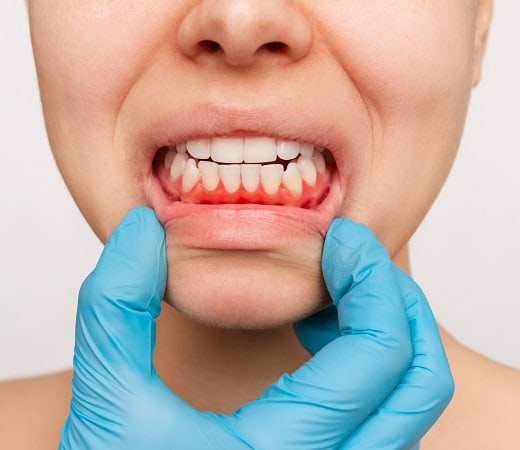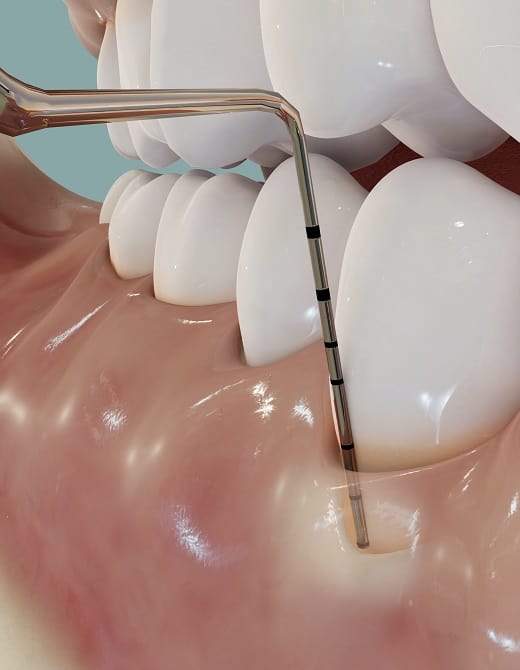
Periodontal Services Seattle

What is a periodontist?
A periodontist is an oral health specialist who treats the supporting structures of the teeth. This includes the gums, the jawbone, and the periodontal ligament. When these structures become compromised, either due to conditions like periodontal disease or physical trauma, tooth loss is likely to follow. Many people in this situation will avoid seeing a periodontist and instead, leave the future of their dental health up to chance. Here at Pacific Northwest Periodontics, we hope that you never choose that route and opt for high-quality dental care instead.
All of our periodontists, Dr. Rapoport, are board-certified periodontists, an award that’s only given to the highest level of achievers in the field of periodontology and dental implant surgery. No matter whether you’re experiencing the early stages of gum disease or you’re considering tooth replacement options, schedule an appointment with us today.
Gum Disease Treatment

Nearly half of all adults over the age of 30 have some form of periodontal disease according to the Centers for Disease Control and Prevention. What’s more, the older we get, the more likely we are to have varying forms of gum disease. If you go to brush your teeth and notice that your gums are swollen, sore, or bleed when you brush or floss, you most likely have some form of gum disease. But don’t worry, this doesn’t mean you should just throw in the towel and call it quits with your oral health. At Pacific Northwest Periodontics, we have effective treatment options for those with gum disease.
PERIODONTAL MAINTENANCE
Periodontal maintenance is another way of saying “professional teeth cleaning.” If you’ve ever been to a dentist, (we hope you have!) then you’re probably pretty familiar with this process. Since gingivitis starts with the accumulation of bacteria, plaque, and eventually tartar, periodontal maintenance is a natural first step to ensure gum disease doesn’t progress.
You may have heard of the term scaling and root planing before. Scaling is the process of removing plaque and tartar from below and above the gumline while root planing refers to smoothing the roots of the teeth so that your gums can successfully reattach to the tooth. This reattachment process is important to prevent pockets from forming between the tooth and gums.
PERIOSCOPE THERAPY
As a minimally invasive alternative to osseous surgery, your periodontist may recommend Perioscope therapy. A Perioscope is a small camera that slides between the tooth and gum and allows your periodontist to locate and treat the diseased area. This is recommended for many patients because surgery isn’t required and it can be an effective way of reversing periodontal disease.
OSSEOUS SURGERY
Due to there being a whole host of other treatment methods for periodontal disease, osseous surgery is typically not recommended. But for more serious cases, it can certainly be beneficial. This surgery involves several processes including a thorough cleaning of the root surface, reshaping bone, and inevitably preventing periodontal pockets which make maintaining healthy teeth very difficult.
These are just several of the procedures your periodontist may recommend after examining your gums and teeth. It’s important to note that these are all methods used to reverse the process periodontal disease. After your procedure, you’ll need to ensure that you improve your oral health practices to ensure your gums don’t become infected again. If you have diabetes or smoke, you are at higher risk of contracting periodontal disease, so you should speak with your periodontist about this.
Gum Recession Treatment
The periodontal specialists at Pacific Northwest Periodontics use the Allen Tunnel Technique to reverse gum recession. Like excess and overgrown gum tissue, receding gums can be the cause of an unhealthy looking smile. However, the main concern with receding gums is the exposed root surface. When gums begin to recede past the gum line, you’ll notice a yellowish brown rough surface near your gums. This is your root. Since the root doesn’t contain enamel like the crown of your tooth, it’s more susceptible to disease and decay.
The Allen Tunnel Technique is used as an alternative to other gum grafting methods. Inevitably, it is more comfortable for the patient, minimizes tissue trauma, and allows for a quicker healing process. There are several causes of gum recession, chief among them is periodontal disease which we discussed earlier. When gums become infected, soft tissue is lost and they begin to recede slowly. As always, it’s important to maintain impeccable oral hygiene practices in order to avoid this. Ensure that when you brush, you get close to the gum line where plaque and tartar build up. Flossing will keep bacteria out from in between the teeth and also keep gums looking healthy.
There are several other causes of gum recession. Genetics may contribute to the rate at which you lose gum tissue; brushing too vigorously can damage the gums; and grinding of the teeth (bruxism) can also contribute to receding gums. If your teeth are crooked or misaligned, there could be a lot of unnecessary stress on your jawbone and gums when you bite down, this can eventually lead to receding gums.
Dental Implants
Tooth replacement procedures are the primary services we offer here at Pacific Northwest Periodontics. Having performed over 10,000 dental implant surgeries, Dr. Rapoport is equipped with both the knowledge and the experience to help you regain the aesthetic appeal and functionality of your natural teeth. Dental implants provide a long-term solution to your dental woes and offer significant advantages over traditional tooth replacement options like dentures and bridges.
Whether you still have all your teeth and believe you may need an extraction and tooth replacement, or you’ve already lost a tooth or teeth, we can help. Before taking any action, we will fully examine your teeth and gums and ask you about your oral health history. This will give us a better idea of whether dental implants will be a good option for you or not. Oftentimes, we are able to reverse tooth decay, periodontal disease, and other oral health issues, avoiding the need for dental implants. But we will always present you with the best options for your situation.
SINGLE-TOOTH REPLACEMENT
The great thing about dental implants is that they can be integrated into your bone and function seamlessly with all your natural teeth. Assuming only one tooth is diseased or is at risk of falling out, single-tooth replacement will be advised. If you’ve been missing a tooth for some time, you’ve probably noticed how difficult it is to eat and speak, and you may even experience discomfort. Since bone tissue in the jaw requires stimulation from the teeth, if there is no tooth there, the process of bone resorption (bone loss) will occur. This could lead to surrounding teeth being lost. A single-tooth dental implant will function just like your natural tooth preserving the bone tissue and allowing you to regain the functionality you once had.
MULTIPLE DENTAL IMPLANTS
If you have two or more missing teeth, multiple dental implants may be right for you. Typically, this type of tooth replacement is secured by two implants on either side of the arch. If you require a full arch of teeth replaced, we offer the All-On-4® dental implant technique. This offers a full arch of teeth supported by four dental implants and allows you to enjoy a stable, reliable, and aesthetic set of teeth.
Relaxation Dentistry
In addition to providing you with long-term solutions for your oral health, Pacific Northwest Periodontics is committed to making our office as comfortable and welcoming for you as possible. Since most people wouldn’t step foot in a dentist’s office without learning about their Relaxation options, we’re going to go over some of our Relaxation procedures we offer here at PNW Periodontics.
LOCAL ANESTHESIA
is used to numb a specific part of the body during smaller procedures. This is typically employed when the surgery is minor, can be done quickly, and doesn’t require muscles to be relaxed.
ORAL RELAXATION
is usually administered around an hour before the procedure and renders you stress and anxiety free during the dental procedure.
NITROUS OXIDE
is inhaled through the nose and will allow you to feel calm and stress-free during your surgical procedure. Since it’s a gas, the effects will wear off very quickly after the nozzle is removed allowing you to go about your daily life.
INTRAVENOUS RELAXATION
puts you in what’s called a “twilight sleep” where you’re still conscious and able to respond to questions, but you’ll be fully relaxed.
Peri-Implantitis
Although dental implants are safe and serve most people very well for the rest of their lives, there are a few issues you may encounter with them, peri-implantitis being the most common. If you notice swollen gums, bleeding around the implant, or that the implant itself is loose, you should visit a certified periodontist immediately. Although these could be signs of gingivitis, they could also be a sign of a failing dental implant. On the other hand, loose implants are sometimes mistaken for loose crowns. This isn’t a dental emergency, but you’ll still want to see your periodontist to get it fixed.
There are two types of dental implant failure including early failure and latent failure. Early failure is more common and occurs when bone or gum tissue doesn’t heal properly after the dental implant is in. Latent failure occurs later and is less common because it results from poor oral hygiene or dental implant maintenance.
FAQs
How do I know if I need a periodontist?

Red, tender, or bleeding gums, chronic bad breath, teeth sensitivity, gum recession, and loose or missing teeth are common reasons for referrals to our office. Our periodontists work with your general dentist to improve your oral health. A general dentist does not have the training or expertise required for advanced gum disease management, bone grafts, replacing missing teeth, and other treatments and procedures. Managing your concerns with a team of dental professionals ensures you receive the best care possible. Your general dentist knows your medical history and previous procedures or treatments and works with our periodontist to tailor your treatment plan.
Is gum disease connected to my overall health?
Yes, though the connection requires more study. Researchers have linked gum disease to diabetes, heart disease, premature birth, low birth weight, rheumatoid arthritis, and other health issues or conditions. A healthy mouth controls oral bacteria with daily brushing and flossing, but bleeding and inflamed gums from gum disease can introduce bacteria in the mouth to the bloodstream. For people with diabetes, this can make managing blood sugar levels more difficult. As bacteria spread through the bloodstream, it can cause inflammation or infection in other body areas, such as the lining of the heart valves or chambers (endocarditis).
Why should I replace a missing tooth?
A single missing tooth can wreak havoc on your mouth. Your jawbone relies on constant pressure from the teeth for its strength. In just 12 months after losing one tooth, you could lose up to 25% of the surrounding jawbone, putting the rest of your teeth in jeopardy. The surrounding teeth will start to shift to fill the gap, affecting your bite, and a missing tooth often begets more missing teeth because of these changes. Your facial shape changes from the lack of support from the teeth and jaw, causing facial sagging that makes you appear older than your given age. Chewing and speaking become more challenging with trouble eating hard foods and slurred speech, and people are often less confident in their smile when it’s incomplete. It’s best to replace a lost tooth as soon as possible to avoid these issues.
Can children develop periodontal disease?

Gum disease is rare among children but can develop with poor oral hygiene or other risk factors, such as genetics, poor diet, diabetes, bruxism, certain medications, and systemic or autoimmune diseases. Hormonal changes during puberty may make teens more likely to experience periodontal disease.
Generally, keeping the teeth clean with regular brushing and flossing and bi-annual exams and teeth cleanings can ensure long-term oral health and prevent gum disease in children and adolescents. Parents should watch for swollen, red, bleeding gums and ongoing bad breath and schedule an appointment if they suspect an oral health issue.
Do Periodontal Exams Hurt?
Periodontal exams assess the teeth, gums, bite, bone structure, and plaque buildup. These appointments are recommended annually, and our periodontists are as gentle as possible during periodontal exams to prevent or minimize discomfort.
Contact Us Today
If you have questions about any of this information or you’re ready to schedule an appointment with our periodontists, give us a call today. Every procedure we complete is done with your long-term dental health and satisfaction in mind, and we won’t make any decisions until you are presented with all viable options. Whether you’re concerned about gum disease or you’re considering dental implants, your oral health matters and there’s never a better time to take action than now. Pacific Northwest Periodontics has been recognized as a top dental specialist by Seattle Metropolitan Magazine four years in a row and both of our doctors are board certified. Give us a call today to get started.



